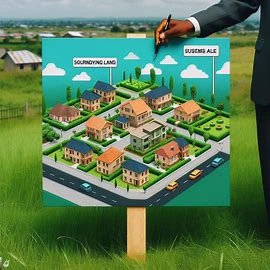Let’s discuss the land buying process in Nigeria.
This post was inspired by a relative who called me a few days ago. It happened that he had acquired a land. It was around half-plot or more, and you know I do not advise this.
He knows that I am an Architect, so I was not dealing with some relative whom I had never met. He bought the land and started building on it until the day he called me. The reason he was calling was to ask me to check a survey plan sketch and ascertain if it was legit.
I was confused. I asked him some questions, then he told me the story.
The story is that the local planning group (what we call “ogbo n’eche agu”), has visited his site and halted construction.
They placed some fines on him and demanded the survey plans and architectural drawings, which he didn’t have. He had to contract a surveyor to come and produce the survey plan.
Then I asked him, “If you didn’t have the survey plan before now, then you also do not have architectural drawings?” He answered in the affirmative.
Apparently, he took some labourers to the site and there and then, mapped out a plan on the earth’s surface using white sand and the diggers started the foundation.
I laughed. Why?
Because, his ignorance, or perhaps not wanting to spend money on professionals, will lead to a lot of fines he has to pay knowing fully well that his religious inclinations will not permit him to settle his problems with a backhand settlement.
Read Also: Architecture Design Fees: How It’s Calculated.
But, you! Yes, you! Don’t start this way. Here is what you should do.

The professionals you need when buying land and the benefits.
You will need a Real-estate agent, a Lawyer, and an Architect, whenever you want to buy land.
A Real-estate agent
- Knows the lands/properties that are available for rent or purchase.
- He/She has contacts already waiting, with available options to meet your pocket size and preferred location.
A Lawyer (Property Law Expert)
- Ensures all legal documents for land buying are documented with the appropriate names.
- He/she protects you from any future dispute that might arise in the course of owning the land.
- They advise you on all the legal dues that a property might have incurred and what you will be inheriting.
- Ascertain if any easement rights, rights of way, any landmarks, or preservation orders on the property. A spot known as the height point from sea level in the whole of west Africa was once destroyed because of this.
To read more of the legal concerns from a legal personnel, go here.

An Architect
- Helps you determine if a land location is viable for the project you wish to carry out on it (unless you are buying for land banking). Even at that, knowing that the land you are buying can be used for a particular development helps with the increase in price value.
- He/she understands land zones and what each area is meant for according to the Nigerian National Building Code. You don’t want to buy land intended for public use in an area zoned for private use.
- They help you check the rules and regulations around the property you want to buy. A client once had this issue, it was a narrow plot. He bought a plot where he was not allowed to put windows or any openings on the right and left sides of the building.
- They also provide you with the architectural drawings when you are ready to develop the land.
Read Also: How to Effectively Read a Floor Plan like a Pro.
The land buying process in Nigeria.
Here is a guide to land buying.
1. Determine your budget.
2. Determine the area that can offer you a sizeable plot within the budget you have.
3. Contact a Real-estate agent and declare your intentions.
4. Consult a Lawyer, the lawyer may also be working in partnership with a Real-estate company.
5. Consult your Architect.
6. When you have seen the land, in conducting your due diligence;
Verify that the person selling the land to you has a seller’s right from the ministry or real-estate company where that property is registered. In rural areas, the quickest way will be to see the local head.
Ensure that the relevant documents that apply to the property are available and ready for transfer.
Have your lawyer review the authenticity of those documents. They should also help you ensure that there are no existing legal battles over the land you want to buy.
Inspect the land with your professionals (never go alone with just the seller), make sure that the beacon numbers match what you will buy, check for erosion, nearby basic amenities, access roads, and existing structures in and around it.
Related: Understanding Shortlet Apartment: How to Invest in Nigeria.

7. Upon satisfaction with the land;
Gather all the necessary documents; execute and sign all documents with all professionals and witnesses.
File and register all documentation with the state government to formally record the purchase and transfer of ownership of land.
The Legal Documents You should receive upon Land purchase.
These include;
A Survey Plan; shows the land boundaries with beacon numbers, the area of the plot, and the dimensions of all sides. If the seller doesn’t have these at the time of selling (perhaps, for plots bought in rural areas), ensure you get a surveyor to do this and mount the beacons with the approval and witness of the owners of the neighbouring plots.
Deed of Assignment; document showing transfer of ownership from the seller to you.
Purchase Receipt; this shows the proof of payment. In some rural areas, the chief or a local head drafts this.
Certificate of Occupancy; this document certifies your legal right to occupy the land.
Power of Attorney; this document authorizes another person to act on your behalf in matters relating to the land you purchased.
In conclusion, I hope you haven’t made the mistake like my relative did. Land buying requires adherence to certain laws to protect you and ensure safe land purchases.





